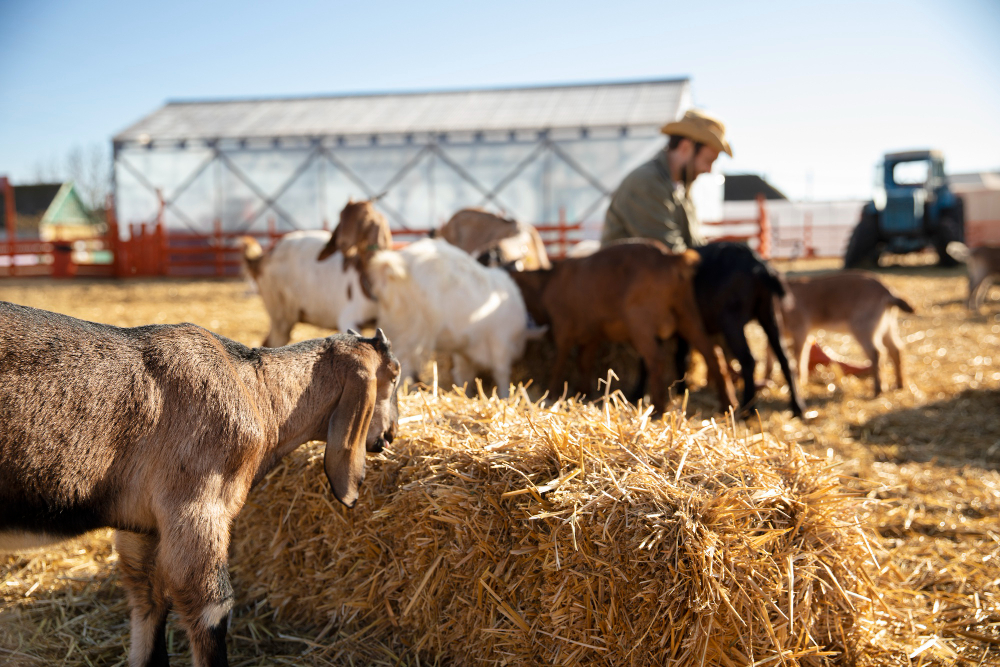Are you struggling to keep your farm animals healthy and thriving? Look no further! Our guide to farm animal nutrition is here to help you find the perfect balance.
From understanding the basics to meeting specific nutrient requirements, we’ve got you covered. Get ready to discover the secrets of balancing protein and energy, and learn how vitamins and minerals can enhance your animals’ well-being.
Get ready to take your farm animal nutrition game to the next level!
Understanding the Basics of Farm Animal Nutrition
To understand the basics of farm animal nutrition, you need to familiarize yourself with the different nutrients required for optimal health. These nutrients can be grouped into six categories: carbohydrates, proteins, fats, vitamins, minerals, and water.
Carbohydrates are an important source of energy for animals and can be found in grains and forages. Proteins are essential for growth and development, and can be found in sources like soybean meal and alfalfa. Fats provide concentrated energy and are found in oils and animal by-products.
Vitamins and minerals are needed in small amounts but play a crucial role in various bodily functions. Lastly, water is vital for digestion, temperature regulation, and overall health.
Essential Nutrients for Farm Animals: What You Need to Know
You need to understand the essential nutrients necessary for your farm animals. Providing them with a balanced diet is crucial for their health and productivity. Here are the four key nutrients your animals require:
- Protein: Essential for growth, reproduction, and overall body function. Sources include soybean meal, fish meal, and alfalfa.
- Carbohydrates: Provide energy for daily activities and bodily functions. Grains like corn, oats, and barley are excellent sources.
- Vitamins: Play a vital role in metabolism, immune function, and overall health. Ensure a sufficient supply of vitamins A, D, and E through supplementation or quality forage.
- Minerals: Necessary for proper bone development, muscle function, and enzyme activity. Provide a balanced mix of calcium, phosphorus, magnesium, and trace minerals like copper and zinc.
Balancing Protein and Energy Requirements for Optimal Growth
Ensure your animals receive a balanced diet to promote optimal growth by understanding and meeting their protein and energy needs.
Protein and energy are two crucial components for the development and growth of farm animals. Protein is essential for building and repairing tissues, while energy provides the fuel for their daily activities.
It’s important to strike the right balance between these two nutrients to ensure your animals reach their full potential. Providing high-quality protein sources such as soybean meal or fish meal can meet their amino acid requirements.
Additionally, supplying adequate energy through grains, forages, or fats will give them the energy they need to support growth and productivity.
Vitamins and Minerals: The Key to Animal Health and Well-being
Don’t overlook the importance of vitamins and minerals for the health and well-being of your animals. They play a crucial role in maintaining their overall health and preventing various diseases. Here are four key reasons why providing your animals with the right vitamins and minerals is essential:
- Supporting growth and development: Vitamins and minerals are essential for the proper growth and development of animals, ensuring that they reach their full potential.
- Boosting immune function: Certain vitamins and minerals, such as vitamin C and zinc, play a critical role in supporting the immune system, helping animals fight off infections and diseases.
- Promoting reproductive health: Adequate levels of vitamins and minerals are necessary for optimal reproductive function in animals, ensuring successful breeding and healthy offspring.
- Maintaining overall health: Vitamins and minerals are involved in various bodily functions, such as metabolism, bone development, and muscle function, contributing to the overall health and well-being of your animals.
Feeding Strategies for Meeting Nutrient Requirements of Different Farm Animal Species
When feeding different farm animal species, it’s important to consider specific strategies that meet their unique nutrient needs. Each species has its own dietary requirements to ensure optimal growth, reproduction, and overall health.
For example, pigs have a higher protein requirement compared to cows or sheep. Therefore, their diet should include protein-rich feed sources such as soybean meal or fish meal.
On the other hand, ruminant animals like cows and sheep have a specialized digestive system that allows them to efficiently utilize fibrous feedstuffs like grass and hay. However, they require a sufficient amount of energy to support rumen function. This can be achieved by providing them with energy-dense feed sources like grains or oilseeds.
Conclusion
You simply can’t underestimate the importance of balanced farm animal nutrition! It’s the magic potion that transforms ordinary animals into extraordinary beings.
With the right combination of essential nutrients, protein, and energy, these animals grow and thrive like never before. And let’s not forget about the vitamins and minerals that keep them healthy and happy.
So, remember, feeding strategies tailored to each species are the secret to unlocking the full potential of your farm animals. It’s like giving them superpowers!

Leave a Reply